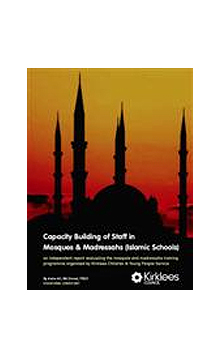
Author: Aisha Ali
Publisher: Kirklees Council
Release Date: August 2008
Source: Kirklees Children & Young People Service, Child Protection & Review Unit
Knowl Park House, Crowlees Road, Mirfield WF14 9PR
Batley, Dewsbury and Huddersfield between them have over 50 madressahs and supplementary schools where about 8,000 – 10,000 children receive religious instruction. This report, authored by Aisha Ali, is an evaluation of a project that aimed at improving governance practice and professionalism in this type of service delivery. The project developed a customised training programme attended by mosque imams and community workers – about 21 such sessions were conducted between December 2007-April 2008. It was directed by the Kirklees Supplementary Schools Coordinator, Shakeel Hafez, building on his earlier work on child welfare awareness within the supplementary schools network. The report describes the steps that were taken to gain community confidence and some of the participants’ responses to ‘culture change’.
At the outset, about 30 imams and mosque representatives participated in a consultation meeting to help define training needs. Five areas emerged: organisational management; classroom and behaviour management and safeguarding children; links and partnerships with public sector organisations; health and safety, including first aid; and a unit aimed at women teachers in the madressah setting. The training was delivered at mosque venues – “the cooperation between the larger and smaller mosques allowed increased links with the local community; by allowing smaller mosques to use the facilities of the larger mosques there was a real sense of collective participation”.
The report highlights the positive role to be played by mosques and madrassas – they are definitely not ‘part of the problem’ , but rather ‘part of the solution’. For example, the author notes, “if we can build upon these excellent community links that madressahs have, and then allow mainstream schools to share these links, then behaviour management within mainstream schools, especially those with a high population of Muslims pupils, will also improve”.
The author also notes that “one of the most successful results of this programme is the inclusion and empowerment of female attendees. It highlights the hard work and commitment of female members of staff who regularly work in madressahs and contribute so much towards the learning and well-being of the children and young people”.
“The capacity building training programme has shown that there is a lot of enthusiasm and scope within the mosques and madressahs themselves to improve and progress. . . “
Far from being ‘incubators of extremism’, mosques and madressahs provide the foundations for good citizenship.
